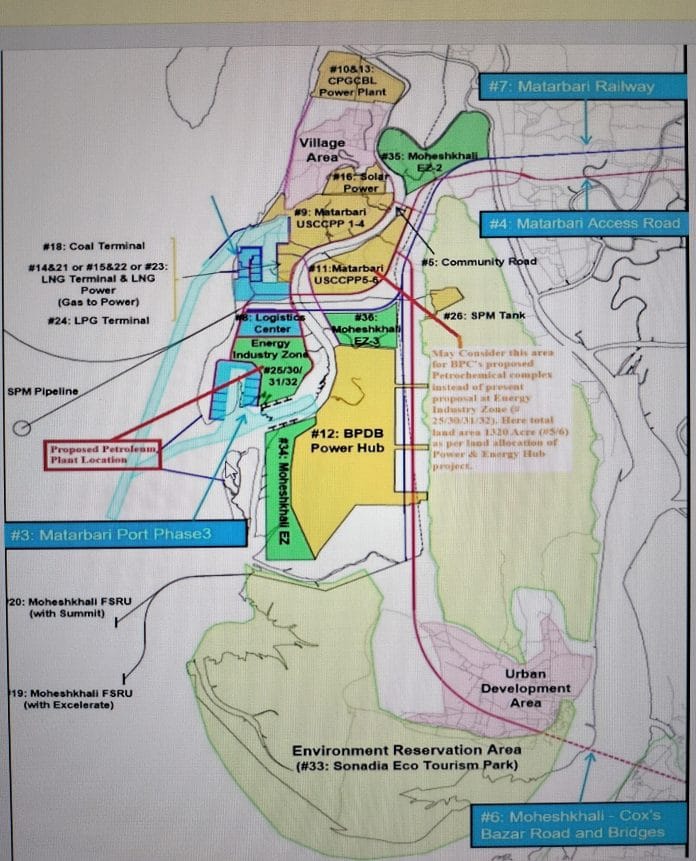The state-owned Bangladesh Petroleum Corporation (BPC) has proposed establishing a large-scale petroleum refinery and petrochemical complex in the Maheshkhali-Matarbari Integrated Development Initiative (MIDI) zone to meet the country’s growing fuel demand and reduce dependency on imported refined petroleum products, a senior official said.
BPC Chairman Amin Ul Ahsan told Just Energy News that the proposed petrochemical complex would have the capacity to process 15–20 million metric tons of crude oil annually. Initially, BPC plans to refine 10 million metric tons.
The government is also working to commission Eastern Refinery Limited (ERL) Unit-2, which would add 3 million metric tons of annual refining capacity to the existing 1.3 million metric tons.
“We’ve identified potential land for the complex and have interested investors,” Ahsan said, although he declined to provide a timeline for the project.
A meeting regarding the proposal was held on Sunday, chaired by Power and Energy Adviser Dr. Muhammad Fouzul Kabir Khan and attended by Power Secretary Farzana Momtaz and senior officials from the Power and Energy Divisions.
The initiative is considered a strategic move to enhance national energy security and reduce import costs, especially as Bangladesh’s petroleum demand grows by 4–5% annually. The country currently has a fuel oil storage capacity of around 1.57 million metric tons – sufficient for only 30–35 days of consumption.
A total of 1,000 acres (404.76 hectares) has been identified within the MIDI zone as a potential site for the refinery. This proposal aligns with the government’s broader plan to develop Maheshkhali and Matarbari into a regional energy and industrial hub.
Several energy-related infrastructure projects are already underway in the area, including a land-based LNG terminal, an LPG terminal, and the expansion of navigable channels under the Chattogram Port Authority.
After allocating land for navigable channels, 92.84 hectares (229.41 acres) remain available for LNG and LPG terminals. The Energy and Mineral Resources Division (EMRD) has proposed using part of the land originally allocated for the Matarbari Ultra Super Critical Coal Power Plant (USCCPP) for the new complex.
This site, adjacent to a recently completed Single Point Mooring (SPM) pipeline, would enable direct unloading of crude oil and diesel, potentially reducing infrastructure costs.
Why a Petrochemical Complex Is Critical
Currently, BPC refines only 1.3 million metric tons of crude oil annually, compared to a national demand of 6.8 million tons.
That demand is projected to rise to 10 million metric tons by FY 2030–31 and to 13 million metric tons by FY 2040–41. Establishing a domestic petrochemical industry would reduce dependence on imported refined oil and save significant foreign currency outflows.
Land Acquisition and Timeline
BPC has formally requested the MIDI Cell under the Chief Adviser’s to revise the land use plan proposed by Japan International Cooperation Agency (JICA) and allocate at least 1,000 acres for the refinery project. Meetings with JICA were held on June 19 and July 3, 2025, regarding the proposal.
The proposed site lies in Plots 25, 30, 31, and 32 of the Energy Industry Zone, next to the LNG/LPG terminal area. Land development by the Chattogram Port Authority is expected to be completed in two phases – Phase 1 by 2026 and Phase 2 between 2027 and 2032.
If the alternative land near the SPM project is approved, the development could start earlier, significantly reducing project costs by leveraging existing infrastructure.

